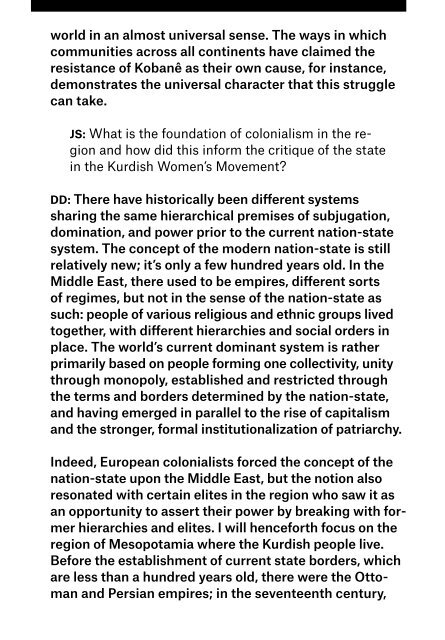Stateless Democracy
1RHiH4Y
1RHiH4Y
You also want an ePaper? Increase the reach of your titles
YUMPU automatically turns print PDFs into web optimized ePapers that Google loves.
world in an almost universal sense. The ways in which<br />
communities across all continents have claimed the<br />
resistance of Kobanê as their own cause, for instance,<br />
demonstrates the universal character that this struggle<br />
can take.<br />
JS: What is the foundation of colonialism in the region<br />
and how did this inform the critique of the state<br />
in the Kurdish Women’s Movement?<br />
Kurdistan was initially divided between these two. In the<br />
early twentieth century, when the Ottoman Empire began<br />
to collapse and the European governments were fighting<br />
Atatürk’s army, the Sykes–Picot Agreement 1 divided borders<br />
along colonialist interests. Some of these borders<br />
were literally drawn with rulers, thus blatantly illustrating<br />
the arbitrary imposition of imagined constructs like the<br />
nation-state, which violate and deny the more fluid and<br />
organic realities on the ground.<br />
32–33<br />
DD: There have historically been different systems<br />
sharing the same hierarchical premises of subjugation,<br />
domination, and power prior to the current nation-state<br />
system. The concept of the modern nation-state is still<br />
relatively new; it’s only a few hundred years old. In the<br />
Middle East, there used to be empires, different sorts<br />
of regimes, but not in the sense of the nation-state as<br />
such: people of various religious and ethnic groups lived<br />
together, with different hierarchies and social orders in<br />
place. The world’s current dominant system is rather<br />
primarily based on people forming one collectivity, unity<br />
through monopoly, established and restricted through<br />
the terms and borders determined by the nation-state,<br />
and having emerged in parallel to the rise of capitalism<br />
and the stronger, formal institutionalization of patriarchy.<br />
Indeed, European colonialists forced the concept of the<br />
nation-state upon the Middle East, but the notion also<br />
resonated with certain elites in the region who saw it as<br />
an opportunity to assert their power by breaking with former<br />
hierarchies and elites. I will henceforth focus on the<br />
region of Mesopotamia where the Kurdish people live.<br />
Before the establishment of current state borders, which<br />
are less than a hundred years old, there were the Ottoman<br />
and Persian empires; in the seventeenth century,<br />
This is colonialism: the forced imposition of borders that<br />
do not reflect the realities, loyalties, or identities on the<br />
ground, but are based solely on western (or other non-local)<br />
interests. It was done in a very insidious way, because<br />
those living in the region were made to believe that they<br />
themselves would rule these newly carved out regions.<br />
This is an example of colonialism that operates by giving<br />
colonial power to somebody else who will colonize the<br />
people by proxy. From a distance, it will appear as if the<br />
people of the Middle East are determining themselves.<br />
In 1923, following the decline and eventual collapse of<br />
the Ottoman Empire, the Turkish Republic was founded.<br />
When plans were being developed to found this new<br />
republic, the Armenian Genocide took place to essentially<br />
clear space for this new state. The Kurds played an<br />
active role in the genocide, and this is something they<br />
have to come to terms with. The Kurds were promised<br />
rights in this new state, but were later struck by the<br />
same oppression.<br />
1. The Sykes–Picot Agreement, signed on 16<br />
May 1916, was an undisclosed agreement<br />
between the governments of the United<br />
Kingdom and France, with support of<br />
Russia, which mapped out the respective<br />
governments’ proposed spheres of influence<br />
in the Middle East. The agreement<br />
was made in anticipation of the Triple<br />
Entente’s defeat of the Ottoman Empire<br />
during World War I.



